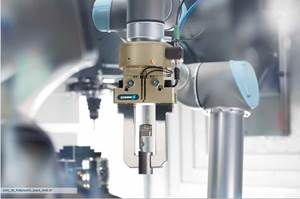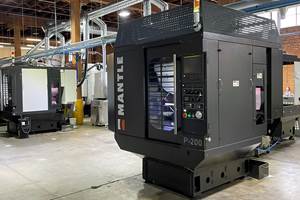From Media to Manufacturing
Video producers with no previous knowledge of CNC discover the power and possibilities of modern machine tool technology. Their example says something about where manufacturing talent might come from, and also about the importance of manufacturing as a whole.
Share


Hwacheon Machinery America, Inc.
Featured Content
View More




Takumi USA
Featured Content
View More

.png;maxWidth=45)
DMG MORI - Cincinnati
Featured Content
View MoreLess than two years ago, Drew Janes could not have imagined that he would soon be purchasing a CNC machining center, plus the associated tooling and software, all to equip a new manufacturing business.
Mr. Janes could not have imagined this, because he is a filmmaker.
The video production company he leads is Relentless Inc. When this company sought to improve the effectiveness of unmanned aerial vehicles (UAVs) for filming from the air, that effort produced an unexpected opportunity. Relentless created a gimbal for stabilizing the camera during UAV flight. Building on this success, the company went on to develop another gimbal for hand-held filming, which allowed for camera motions that otherwise would be difficult to achieve smoothly. When Relentless’s staff showed up at a film-industry convention in early 2012 with just a prototype of this hand-held gimbal, the staff members received so many orders that it became clear they would be going into production. The media company suddenly faced challenges related to manufacturing.
A sister company was launched to focus on producing and supplying the gimbals. This company, Defy Products, began by sharing space with Relentless in Tempe, Arizona, but that soon changed.
For machining work, Defy initially turned to experts. That is, Mr. Janes went to an established CNC machining job shop to get parts made. But the cost was high, he says. More significantly, relying on an external supplier left Defy subject to that shop’s timing. That shop had customers that accounted for much more of its business than Defy, making it challenging for the gimbal maker to compete for the attention and production capacity needed for the small company to go to market quickly.
So, in place of experts, the staff of Defy looked to itself. Staff member of the company knew little or nothing about machining, but they believed they could learn. The company purchased a small CNC mill with very limited capabilities—a machine suited for R&D settings or simple production. This purchase was the new company’s first notable investment and arguably also its first notable misstep. It quickly became clear that Defy would need a machine with more speed, power and capacity in order to have any hope of meeting its production demand.
Mr. Janes decided to buy a Haas VF-2SS vertical machining center. Not only that, he decided to relocate Defy’s manufacturing team to a space large enough to serve as a committed production facility. This new location, nearby in Phoenix, Arizona, is now where the company machines, inspects and assembles the components of three different models of gimbal. To date, hundreds of gimbals have now been shipped, and the production process keeps getting more efficient as team members discover increasingly more effective choices related to part setup, tooling and programming. Each person involved in production at the very start had, until then, been employed in video production (working for Relentless), with little prior awareness of CNC. A few weeks in, when the company hired a recent graduate of a college manufacturing program, this person became the only team member with a manufacturing background.
Defy’s story—small though it might be—is noteworthy within the current environment in which skilled manufacturing talent is proving scarce. Today, many manufacturers are coming to the conclusion that they need to cultivate skilled employees by training them internally, and many of these companies are now struggling with how to allocate senior personnel to train new hires. But at Defy, there were no senior personnel. No one had programmed a machine tool before. They set about learning.
The company’s experience illustrates a variety of significant points. Here are some I see:
1. Machining technology has become easier to use. The barriers to entry into relatively sophisticated manufacturing work are not as high as they once were.
I asked Mr. Janes whether any experienced machinist had been involved with the company’s launch or had advised staff members to get them started. He replied, “I wish! That would have been a great help.” In the absence of this, Defy’s team taught itself. Haas Automation, the supplier of Defy’s machine, has engineered its control interface with the aim of making it intuitive and easy to learn. Defy’s success suggests the extent to which the machine tool company has succeeded at this.
2. When skills are missing, the quality to look for in employees might be enthusiasm combined with the capacity to learn. Where this enthusiasm and capacity are high, a lack of basic skills can be quickly overcome.
Enthusiasm is certainly high at Defy, where the employees over the past year have become excited about the newfound power of a modern CNC machining center (newfound to them,that is) and what this resource permits them to do. These creative people have always been able to design in an abstract sense, but the ability now to bring the design of a useful object all the way through to completion—all the way through to tangible reality—still feels like an amazing breakthrough.
Mr. Janes is caught up in it himself. “I find myself now looking at things around me that are slightly misadjusted and jokingly saying, ‘I think that’s a thousandth off.’” It is a joy to discover the importance of measurements in thousandths of an inch, he says. “I wouldn’t have thought about things that way before.”
In fact, the change in thinking goes much further. It goes all the way to what is arguably the most significant point of all, namely:
3. Manufacturing is important. It is an enabler to innovation.
What the staff of this company has discovered through its learning curve with manufacturing technology is not just the excitement of something new, but also a level of creative freedom it did not anticipate. Back when Defy was relying on an external supplier to make its parts, there was real caution—real fear—inhibiting the way team members designed components. Cost was high and lead times were long, so the company couldn’t afford to make mistakes. It could not afford to play around with design changes for gimbal components that might have delivered only a subtle improvement.
But with the machining center on site, that fear is gone. Any idea for a new part or a modified part can be prototyped just as soon as the machine is next available. Defy is now leveraging this freedom by expanding its product line to include accessories tailored to various camera models. Any seemingly promising idea for a piece of accessory hardware can be quickly made real, and just as quickly tested to see whether the idea has merit and how the idea might be improved. The point illustrated in this is arguably just as valid for a global company as it is for an Arizona startup. That is: Real value comes from having design and manufacturing close enough that they can synergize.
“By getting our own machining center, I thought we would be cutting our costs and improving our timing. That’s all I expected,” says Mr. Janes. “What I found out is that I love manufacturing. And the reason why is because I love design.” Design and manufacturing are one, he discovered. They belong together. Master the ability to produce, and the ability to invent is set free.
Related Content
DN Solutions' VMC Provides Diverse Five-Axis Machining
The company’s DVF Series comprises compact five-axis CNC machines that are designed for diverse five-sided or simultaneous five-axis applications.
Read MoreLean Approach to Automated Machine Tending Delivers Quicker Paths to Success
Almost any shop can automate at least some of its production, even in low-volume, high-mix applications. The key to getting started is finding the simplest solutions that fit your requirements. It helps to work with an automation partner that understands your needs.
Read MoreHow a Custom ERP System Drives Automation in Large-Format Machining
Part of Major Tool’s 52,000 square-foot building expansion includes the installation of this new Waldrich Coburg Taurus 30 vertical machining center.
Read MoreIn Moldmaking, Mantle Process Addresses Lead Time and Talent Pool
A new process delivered through what looks like a standard machining center promises to streamline machining of injection mold cores and cavities and even answer the declining availability of toolmakers.
Read MoreRead Next
5 Rules of Thumb for Buying CNC Machine Tools
Use these tips to carefully plan your machine tool purchases and to avoid regretting your decision later.
Read MoreBuilding Out a Foundation for Student Machinists
Autodesk and Haas have teamed up to produce an introductory course for students that covers the basics of CAD, CAM and CNC while providing them with a portfolio part.
Read MoreRegistration Now Open for the Precision Machining Technology Show (PMTS) 2025
The precision machining industry’s premier event returns to Cleveland, OH, April 1-3.
Read More

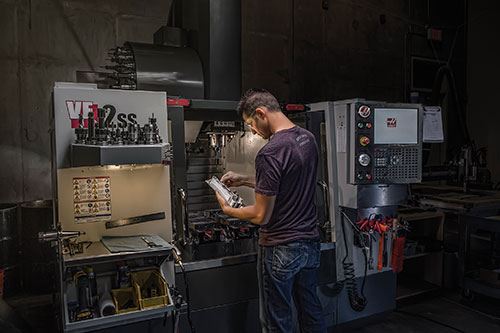
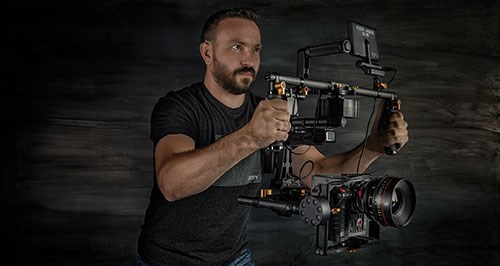
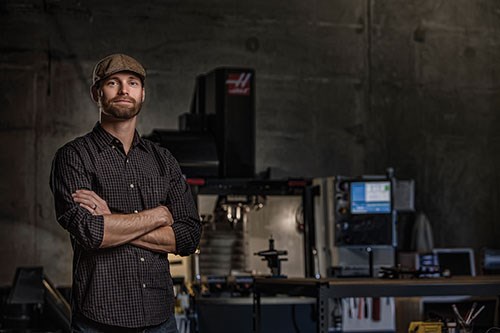
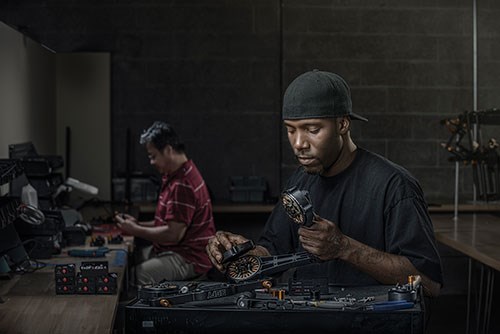




























.jpg;maxWidth=300;quality=90)









.jpg;maxWidth=300;quality=90)





